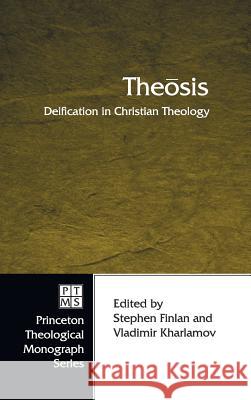Theosis » książka
Theosis
ISBN-13: 9781498247580 / Angielski / Twarda / 2006 / 194 str.
Theosis
ISBN-13: 9781498247580 / Angielski / Twarda / 2006 / 194 str.
(netto: 188,05 VAT: 5%)
Najniższa cena z 30 dni: 195,29
ok. 16-18 dni roboczych.
Darmowa dostawa!
Description: ""'Deification' refers to the transformation of believers into the likeness of God. Of course, Christian monotheism goes against any literal 'god making' of believers. Rather, the NT speaks of a transformation of mind, a metamorphosis of character, a redefinition of selfhood, and an imitation of God. Most of these passages are tantalizingly brief, and none spells out the concept in detail. ""Deification was an important idea in the early church, though it took a long time for one term to emerge as the standard label for the process. That term was qe/wsij, theosis, coined by the great fourth-century theologian, Gregory of Nazianzus. Theologians now use theosis to designate all instances where any idea of taking on God's character or being ""divinized"" (made divine) occurs, even when the term qe/wsij is not used. And of course, different Christian authors understood deification differently."" ""While some articles in this collection discuss pre-Christian antecedents of theosis, Greek and Jewish, most focus on particular Christian understandings. The article by Gregory Glazov examines OT covenant theology, with an emphasis on divine adoption, and on bearing the fruit of knowledge or attaining the stature of a tree of righteousness in Proverbs, Isaiah, and Sirach. The article by Stephen Finlan on 2 Pet 1:4 ('You may become participants of the divine nature') examines the epistle's apparent borrowings from Middle Platonic spirituality, Stoic ethics, and Jewish apocalyptic expectation. The epistle stresses 'knowledge of Christ, ' which means cultivation of godly character and growing up into Christ."" --from the Introduction Endorsements: ""If one were to seek a single volume constituting an up-to-date and learned coverage of the subject, this is the book."" --J. Robert Wright, General Theological Seminary, as reviwed in Religious Studies Review ""An extraordinary collaboration of scholars examining the neglected theme of deification in the classic Christian tradition from its biblical roots through Irenaeus, Augustine, and Maximus, to contemporary reconstructions of Torrance and Soloviev."" --Thomas C. Oden, General Editor, Ancient Christian Commentary on Scripture. ""Salvation as divinization is being recognized by historians and retrieved by contemporary theologians. Here is a wonderfully comprehensive and academically careful presentation of theosis from the Bible until Vladimir Soloviev. It is a superb contribution to fresh Christian thinking."" --Ellen T. Charry Margaret W. Harmon Associate Professor of Systematic and Historical Theology, Princeton Theological Seminary, and editor of Theology Today About the Contributor(s): Stephen Finlan is an Adjunct Professor at Drew University and Seton Hall University. He is the author of Options on Atonement in Christian Thought; Problems with Atonement: The Origins of, and Controversy about, the Atonement Doctrine; and The Background and Content of Paul's Cultic Atonement Metaphors. Vladimir Kharlamov is an Assistant Professor of Spiritual Theology at Sioux Falls Seminary.
Description:""Deification refers to the transformation of believers into the likeness of God. Of course, Christian monotheism goes against any literal god making of believers. Rather, the NT speaks of a transformation of mind, a metamorphosis of character, a redefinition of selfhood, and an imitation of God. Most of these passages are tantalizingly brief, and none spells out the concept in detail. ""Deification was an important idea in the early church, though it took a long time for one term to emerge as the standard label for the process. That term was qe/wsij, theosis, coined by the great fourth-century theologian, Gregory of Nazianzus. Theologians now use theosis to designate all instances where any idea of taking on Gods character or being ""divinized"" (made divine) occurs, even when the term qe/wsij is not used. And of course, different Christian authors understood deification differently."" ""While some articles in this collection discuss pre-Christian antecedents of theosis, Greek and Jewish, most focus on particular Christian understandings. The article by Gregory Glazov examines OT covenant theology, with an emphasis on divine adoption, and on bearing the fruit of knowledge or attaining the stature of a tree of righteousness in Proverbs, Isaiah, and Sirach. The article by Stephen Finlan on 2 Pet 1:4 (You may become participants of the divine nature) examines the epistles apparent borrowings from Middle Platonic spirituality, Stoic ethics, and Jewish apocalyptic expectation. The epistle stresses knowledge of Christ, which means cultivation of godly character and growing up into Christ."" --from the IntroductionEndorsements:""If one were to seek a single volume constituting an up-to-date and learned coverage of the subject, this is the book.""--J. Robert Wright, General Theological Seminary, as reviwed in Religious Studies Review""An extraordinary collaboration of scholars examining the neglected theme of deification in the classic Christian tradition from its biblical roots through Irenaeus, Augustine, and Maximus, to contemporary reconstructions of Torrance and Soloviev."" --Thomas C. Oden, General Editor, Ancient Christian Commentary on Scripture.""Salvation as divinization is being recognized by historians and retrieved by contemporary theologians. Here is a wonderfully comprehensive and academically careful presentation of theosis from the Bible until Vladimir Soloviev. It is a superb contribution to fresh Christian thinking.""--Ellen T. CharryMargaret W. Harmon Associate Professor of Systematic and Historical Theology, Princeton Theological Seminary, and editor of Theology TodayAbout the Contributor(s):Stephen Finlan is an Adjunct Professor at Drew University and Seton Hall University. He is the author of Options on Atonement in Christian Thought; Problems with Atonement: The Origins of, and Controversy about, the Atonement Doctrine; and The Background and Content of Pauls Cultic Atonement Metaphors.Vladimir Kharlamov is an Assistant Professor of Spiritual Theology at Sioux Falls Seminary.











